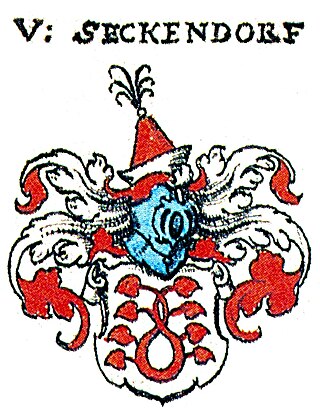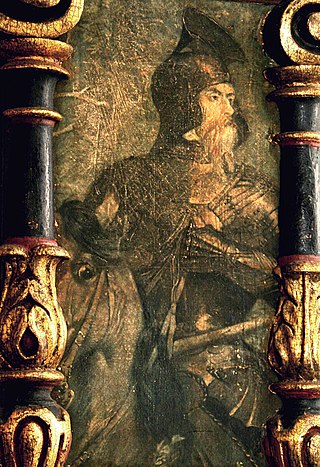Related Research Articles

Adolph Franz Friedrich Ludwig Freiherr Knigge was a German writer, Freemason, and a leading member of the Order of the Illuminati.

Weimar Classicism was a German literary and cultural movement, whose practitioners established a new humanism from the synthesis of ideas from Romanticism, Classicism, and the Age of Enlightenment. It was named after the city of Weimar, Germany, because the leading authors of Weimar Classicism lived there.

The House of Bibra was one of the leading Uradel families in Franconia and present day Thuringia from the mid-15th century to about 1600. Later on the family rose from Reichsritter to Reichsfreiherr. After the Holy Roman Empire dissolved, they were made ‘’Freiherr’‘ (Barons) of Bavaria and Bohemia.

Corona Elisabeth Wilhelmine Schröter was a German actress and musician best known as a singer. She also composed songs, setting texts by Friedrich Schiller and Johann Wolfgang von Goethe to music.

Johann Karl Wezel, also Johann Carl Wezel, was a German poet, novelist, and philosopher of the Enlightenment.
Erwin und Elmire is a singspiel, described as a Schauspiel mit Gesang, in two acts by the German composer Johann André, with a libretto by Johann Wolfgang von Goethe, after Oliver Goldsmith's ballad of Angelica and Edwin, The Hermit, in chapter 8 of his sentimental novel The Vicar of Wakefield.

Lorenz von Westenrieder was a well-known author and historian in Bavaria and a critic of the Elector Karl Theordor and supporter of Maximilian IV Joseph. There are several memorials to him in Munich.

Dietrich Heinrich Ludwig Freiherr von Ompteda was a Hanoverian jurist and government minister.

"Das Veilchen", K. 476, is a song for voice and piano by Wolfgang Amadeus Mozart, written in Vienna on 8 June 1785, to a poem by Johann Wolfgang von Goethe.

The Park an der Ilm is a large Landschaftspark in Weimar, Thuringia. It was created in the 18th century, influenced by Johann Wolfgang von Goethe, and has not been changed much, preserving a park of the period. It forms part of the World Heritage Site "Classical Weimar along with other sites across Weimar bearing testimony to the city's historical importance as a cultural hub during the Weimar Classicism movement in the late 18th and 19th centuries".

The House of Seckendorff is the name of an old and prolific Franconian noble family. According to historian Werner Wagenhöfer, the Seckendorff family is the most researched family of the low nobility in Franconia along with the Guttenberg and Bibra families.

Walther Wolfgang Freiherr von Goethe was a German composer and court chamberlain. He was one of the grandsons and last living descendant of Johann Wolfgang von Goethe.
Johann Karl Wilhelm Voigt was a German mineralogist and mining engineer.

The Franconian War was waged in 1523 when the Swabian League attacked several robber baron castles in Franconia, whose nobles were supporters of Hans Thomas of Absberg in the Absberg Feud.

The House of Egloffstein is an ancient Franconian aristocratic family (Uradel) with an eponymous family home in the hill region of Franconian Switzerland in the Bavarian province of Upper Franconia. The family first appears in the records in 1187 with a Heinrich genannt Stuchs who is also the progenitor. The house belongs to the brotherhood of Franconian Imperial Knights. Egloffstein Castle and Kunreuth Castle are to this day owned by the family.
The 13 Cuirassier regiments of Old Prussia were formed in the mid-17th to mid-18th centuries, and formed the basis of Frederick the Great's vaunted cavalry.
Rosamunde is a singspiel in three acts by Anton Schweitzer to a German-language libretto by Christoph Martin Wieland, first performed on 20 January 1780 at the Nationaltheater Mannheim. The singspiel was revived by the 60th Schwetzingen Festival in 2012 in a production by Jens-Daniel Herzog.
Friedrich August Burgmüller was a German pianist, Kapellmeister and conductor as well as the first municipal music director in Düsseldorf and co-founder of the Lower Rhenish Music Festival. He is the father of the composers Friedrich Burgmüller and Norbert Burgmüller.
Philipp Christoph Kayser was a German pianist, composer, orchestra musician, music teacher and poet. He was a close friend of Johann Wolfgang von Goethe.
References
- Bauman, Thomas (2001). "Karl Siegmund von Seckendorff". In Sadie, Stanley; Tyrrell, John (eds.). The New Grove Dictionary of Music and Musicians (2nd ed.). London: Macmillan Publishers. ISBN 978-1-56159-239-5.
- Constantin von Wurzbach. "Seckendorf, Karl Sigmund Freiherr von." In Biographisches Lexikon des Kaiserthums Oesterreich, vol. 33. Vienna: Verlag L. C. Zamarski, 1877, p. 268.
- Franz Brümmer (1891), "Seckendorff, Karl Sigmund Freiherr v.", Allgemeine Deutsche Biographie (in German), vol. 33, Leipzig: Duncker & Humblot, p. 518
- Valentin Knab: Karl Siegmund von Seckendorff (1744–1785). Ein Beitrag zur Geschichte des deutschen volkstümlichen Liedes und der Musik am Weimarer Hof im 18. Jahrhundert (In: 60. Jahresbericht des Historischen Vereins für Mittelfranken, Ansbach 1914, S. 17–184)